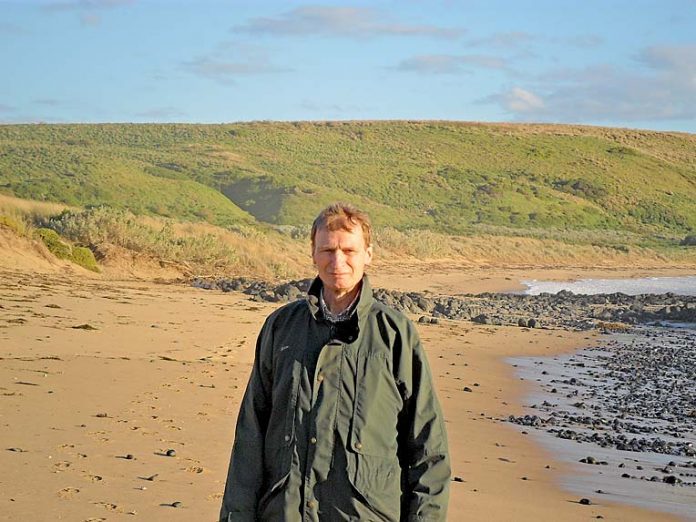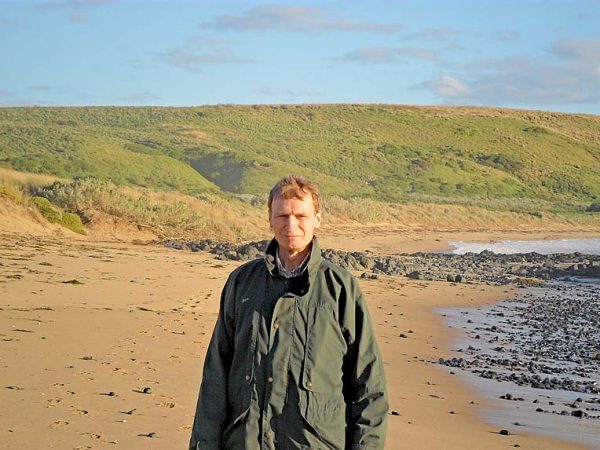

BARRY McGowan was acknowledged both nationally and internationally for his expertise in recording the history of gold mining in Australia and passion for the history and heritage of Chinese people in rural and regional Australia.
He became a vocal and passionate advocate for creating public awareness of the pioneering role of the Chinese in the pastoral and agricultural development of Australia.
Sadly, after a long battle with prostate cancer, Barry passed away on September 1.
In June this year he was awarded an Order of Australia Medal (OAM) for services to community history.
His ill health made it impossible for him to be able attend the investiture, so on August 30 Governor General Sir Peter Cosgrove, in a very generous act, visited the Canberra Hospital and personally presented Barry with his OAM.
Born to John and Olga McGowan (nee Barrows) in Oakleigh, Victoria, Barry moved with his parents to Mount Gambier in 1948 after they had purchased Gitshams Gocery Store.
Barry attended the Wehl Street Primary School and Mount Gambier High School.
Like many young people at that time, he had to board in Adelaide to complete his leaving honours.
After completing a Bachelor of Economics at the University of Adelaide in 1967, Barry spent two years in Noumea working for Australian Volunteers Abroad as an assistant economist for the South Pacific Commission.
He maintained his interest in the colonial history of the Pacific and only recently published an article on the Communards transported to the French penal colony of New Caledonia.
Barry moved to Canberra in the late 1960s and joined the federal public service working for the Department of Industrial Relations and Prime Minister and Cabinet, rising to director level.
His passion for writing began with articles for the Australia Post and 4×4 magazine, based on his off-road adventures in a trusty Subaru wagon.
As his interest in ghost towns and the history of mining communities grew, he began writing for Heritage Australia.
Barry’s first book on mining, Historic Mining Communities of the Monaro and Southern Tablelands Districts of New South Wales, was published in 1994.
A lot of his initial research was based on the goldfields around the Braidwood, Mongarlowe and the Shoalhaven areas of New South Wales.
In 1995, he returned to the Australian National University to study for a Bachelor of Arts degree.
Eventually his interests in history led to him leaving the public service and establishing himself as a historian and heritage consultant.
His first hard cover book Australian Ghost Towns was published in 2002.
In the same year he completed a doctorate at the Australian National University (ANU).
His thesis Dust and Dreams: A Regional History of Mining and Community in South-East New South Wales 1850-1914, was published as a book in 2010.
His knowledge of mining history led him to increasingly focusing on the history and heritage of Chinese communities in rural and regional Australia.
He was particularly keen to uncover and highlight how central Chinese labour was to pastoral and agricultural development in Australia.
He was a pioneer in the approach of connecting a detailed history of Chinese-Australian historical sites with the personal and community histories of those Chinese Australians who created those sites and their descendants.
Barry was also a recipient of the Jennifer Cushman Memorial Endowment Fund Grant in 2012 and 2017.
In turn, he became a mentor to a new generation of historians, sharing his knowledge freely and inspiring with his enthusiasm.
A long-time Research Fellow at ANU, Barry was involved in the Centre for Chinese Southern Diaspora Studies and contributed many articles to the centre’s journal.
Most recently Barry co-authored True Australians and Pioneers: Chinese Migration to the Orange Region of NSW, a history of Chinese people in the Orange, Blayney and Cabonne Shires and the town of Wellington.
He was a sought after speaker at conferences of the Australian Mining History Association and also had been invited to present papers in China and Canada and will be missed by his many colleagues, friends and family.
Barry is survived by his partner Chong, his sons Andrew and Douglas and their families and his brother Chris.







